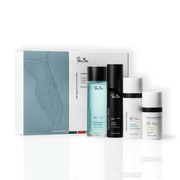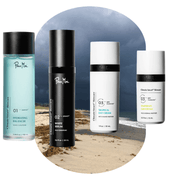07 October 2024
Humidity and sweat can be a rollercoaster for your skin. Learn why it’s a love-hate relationship and tips for a balanced complexion in even the muggiest climate.
Breakouts? Greasiness? Makeup meltdowns? Sweat and humidity can be your skin’s BFFs or worst enemies.
At Pour Moi Skincare, we’ve invested decades of research into developing our Climate-Smart® skincare, and we know that moisture can be the difference between a fresh-faced glow or an oily mess. We’re committed to innovating products that work with your environment, not against it.
So, is humidity good for your skin or is it a little more complicated than that?
Let’s zoom in on how humidity and sweat impact your skin. If you’re ready to fight back against sticky weather and take control of your complexion, keep reading! 💪
What Are the Effects of Humidity and Sweat on Skin?
When it's humid, the air feels thick and heavy because it's saturated with water vapor.
You know those sticky summer days when your makeup slides around your face the moment you step outside? You can thank high humidity for that. 💦
Humidity can fluctuate based on a few factors.
- Living close to water means it evaporates into the atmosphere more, therefore increasing humidity. Warm air also holds more moisture than cold air.
- Mountains and other landforms also influence humidity patterns depending on how air circulates and vapor condenses in certain geographic areas [1].
- Even cooking, cleaning, showering, and breathing creates indoor humidity.
In case you didn’t know, your body has a natural cooling system that kicks in whenever things heat up. That system is perspiration. 😅
When your body temperature rises, sweat glands release water onto the dermis (or skin's surface) [2].
The kicker? Sweating doesn't cool you down directly — it's the evaporation of sweat from your skin that does the trick [3].
When sweat evaporates, it takes heat energy with it, leaving your skin (and body) feeling cool as a cucumber. Now, here's where humidity throws a wrench in the works.
With more moisture saturating the air, it has less capacity to absorb the surplus from your sweat. In other words, your sweat evaporates slower, making it feel hotter and stickier in super humid areas like the tropics. Miami, anyone? 🌴
Sweat, Humidity, and Your Skin Barrier
Your skin's outermost layer, the stratum corneum, is your complexion’s built-in protective barrier. It keeps your skin hydrated, healthy, and shielded from the outside world. The goal? Keep moisture in and irritants out. 🛑
However, this barrier isn’t immune to changes in your surroundings, like fluctuations in sweat and humidity.
First, let’s touch on the drawbacks.
The Downsides of Hot, Sticky Climates on Your Skin
- Breakouts and acne: Humidity can cause acne due to the combination of sweat, oil, and humid air. This can clog pores and create a breeding ground for bacteria, and in turn, breakouts and acne flare-ups.
- Dehydration: When sweat can't evaporate as easily, it dampens the environment on your skin's surface. This can disrupt its natural moisture balance and lead to dehydration, causing tightness, flakiness, and a dull complexion [4].
- Barrier disruption: Fluctuations in humidity can compromise your stratum corneum, increasing transepidermal water loss (TEWL) [5]. This makes your skin more susceptible to dryness, irritation, and sensitivity.
- Oiliness: Humidity can trigger your skin to produce more oil (sebum) to recalibrate its natural moisture [6]. This can result in a shiny, greasy complexion, especially for those with oily or combination skin.
- Heat rash: When sweat ducts become blocked, it can lead to heat rash (also known as prickly heat). This is characterized by small, itchy bumps on the skin.
- Eczema flare-ups: As for humidity and skin rashes, those of us who struggle with eczema might find that sticky weather can exacerbate dermatitis symptoms like itching, redness, and inflammation [7].
The good news? Sweat and humidity can also work in your skin’s favor.
The Upsides of Sweat and Humidity
- Boosts hydration: While sweat is 99% water and 1% salt/fat, it also contains small amounts of urea and lactic acid [8, 9]. These lock in moisture on your skin's surface.
- Reduces flakiness: Dry, dehydrated skin is ground zero for flakiness and roughness. Humidity can help smooth rough patches thanks to a little extra moisture.
- Combats inflammation: Some research suggests that sweat might contain anti-inflammatory compounds that benefit the skin, particularly in conditions like acne and eczema [10].
- Gives you a dewy glow: Ever wonder, “Why does my skin look better in humidity?” The extra moisture in humid air helps keep your skin nice and hydrated, reducing the appearance of fine lines, wrinkles, and dullness.
You see? It’s not all bad news. 😉 However, enjoying these perks means implementing the right products and habits.
7 Skincare Tips to Thrive in Hot, Humid Climates
Here’s how to keep your complexion cool, calm, and collected, no matter how sticky the climate gets:
1. Cleanse and exfoliate regularly
Humidity traps sweat and dirt, which is an open invitation for bacteria and grime that clog pores and trigger breakouts.
Cleanse your face daily and exfoliate regularly with a gentle formula, like Pour Moi's Clarifying Polish, to remove dead skin cells and unveil a healthy glow.
2. Adapt your skincare to your environment
Your skin's needs shift with the seasons and climate, and your skincare should follow suit.
Our Southeast collection is your skin's ultimate defense against humidity, bouncing excess moisture away while fortifying its delicate barrier. It's the perfect solution for those sweltering days spent outdoors and the drying effects of air-conditioned spaces.
But humidity isn’t just a summer problem. Even cooler climates get their share of damp, dreary days. That's why we created a Rainy Weather collection for cool and humid climates to balance hydration, even when the sun's hidden away.
3. Don’t skip the SPF
The sun’s rays are harmful year-round, especially in humid destinations like the Caribbean, where tropical breezes and high UV go hand-in-hand. Sunscreen is your best defense against sun damage, premature aging, and skin cancer.
4. Choose the right clothing
Loose-fitting, breathable fabrics help wick away moisture so your skin can breathe. Avoid tight, heavy clothing that traps sweat and leads to potential irritation.
5. Stay hydrated and eat a balanced diet
Drinking plenty of water helps regulate oil production and keeps your skin plump and hydrated. A diet rich in fruits, vegetables, and healthy fats also supports skin health [11].
6. Opt for oil-free makeup
Heavy makeup can clog pores and worsen breakouts in humid climates. Make the swap to oil-free, non-comedogenic formulas that let your complexion breathe.
7. Listen to your skin
Your skin is constantly evolving, influenced by both internal and external factors. Stay in tune with its needs and pivot your routine when it feels right for a complexion that truly thrives in any climate.
Conclusion: Glow in All the Right Ways with Pour Moi Skincare
Bottom line: A little sweat and humidity is good for your skin, although they might get on your nerves now and then. But without them? Your skin’s protective barrier wouldn’t be the strong, resilient guardian it is today.
Does that mean Mother Nature should be the one to dictate your skin's fate? Not a chance. 😏 From steamy summer days to crisp, chilly winters, your complexion deserves love and protection that defies the elements.
Experience Pour Moi's Climate-Smart® skincare and unleash a complexion that’s as radiant as you are, no matter the weather.
References
The Orographic Effect. Student Materials. https://serc.carleton.edu/integrate/teaching_materials/water_science_society/student_materials/751
The Editors of Encyclopedia Britannica. Sweat gland | anatomy. In: Encyclopædia Britannica. ; 2018. https://www.britannica.com/science/sweat-gland
Gagnon D, Crandall CG. Sweating as a Heat Loss Thermoeffector. Handbook of Clinical Neurology. 2018;156(1):211-232. doi:https://doi.org/10.1016/B978-0-444-63912-7.00013-8
Dehydrated skin: Symptoms, causes, treatment, and more. www.medicalnewstoday.com. Published January 27, 2021. https://www.medicalnewstoday.com/articles/dehydrated-skin
Shreya Sreekantaswamy, Meyer J, Grinich E, Leshem Y, Simpson E, Abuabara K. Utility of transepidermal water loss‐stratum corneum hydration ratio in atopic dermatitis. Skin Research and Technology. 2024;30(5). doi:https://doi.org/10.1111/srt.13709
Managing acne in humid weather | Schlessinger MD. Schlessingermd.com. Published June 5, 2024. Accessed September 18, 2024. https://www.schlessingermd.com/managing-acne-in-humid-weather/
Engebretsen KA, Johansen JD, Kezic S, Linneberg A, Thyssen JP. The effect of environmental humidity and temperature on skin barrier function and dermatitis. Journal of the European Academy of Dermatology and Venereology. 2015;30(2):223-249. doi:https://doi.org/10.1111/jdv.13301
Sweating - Health Video: MedlinePlus Medical Encyclopedia. medlineplus.gov. https://medlineplus.gov/ency/anatomyvideos/000127.htm
Clinic C. Breaking a Sweat: Why You Sweat and What It Says About Your Health. Cleveland Clinic. Published October 14, 2020. https://health.clevelandclinic.org/why-we-sweat
Shiohara T, Mizukawa Y, Shimoda-Komatsu Y, Aoyama Y. Allergology International. Science Direct. Published October 2018. https://www.sciencedirect.com/science/article/pii/S1323893018300947
Schagen SK, Zampeli VA, Makrantonaki E, Zouboulis CC. Discovering the link between nutrition and skin aging. Dermato-Endocrinology. 2012;4(3):298-307. doi:https://doi.org/10.4161/derm.22876













